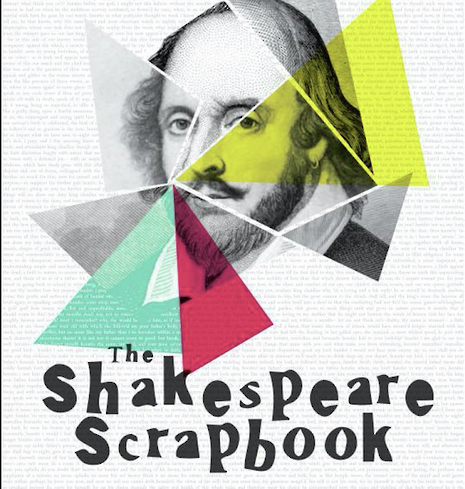Review: The Shakespeare Scrapbook
‘A crackling, mischievous, overblown hodgepodge of an hour’, writes Celeste Pan of CUSP’s production of The Shakespeare Scrapbook

A panel from Birdsong, pushed aside and looming imposingly to the left of the stage. A grass-green metal barrel and two wooden crates, placed centre-right. A beam of vertical light, tinted yellow. The set of Gaia Fay Lambert’s The Shakespeare Scrapbook cannot be more various, deconstructive and deliberately rudimentary, while the murmur of pop music in the background gives a further hint at the light-hearted, modernised nature of what is soon to follow.
“A brief yet indulgent celebration of all things Shakespearean”
It may be said that the show is one that defies all classifications of genre. A mind-boggling admixture of sketches, dramatic scenes and poetry reading, seasoned with music, physical theatre and downright farce, it is a brief yet indulgent celebration of all things Shakespearean. Between the episodes are brief interjections from the Bard himself (Alex Franklin), performed with exaggerated loquaciousness and an almost clownish panache. However, the effect of his desperate bellowing and tense physicality, most prominent in the first half of the show, remains largely uncertain; a more selective representation of outbursts and more distinguishable emotional fluctuations may profit the comicality of the character even further.
The fragments of different natures are strategically arranged in such a way as to balance physical vigour with emotional intensity in the performers, and frantic laughter with silent contemplation in the audience. A postmodern first date between Hamlet (Seth Kruger) and Ophelia (Olly Francis), enhanced by the delicious contrast between the frantic neuroticism of one and the innocent inertia of the other, is followed by a initially sombre and impassioned rendition of Sonnet 18.
Following this, a caricature of the violent clash between Hermia (Nolwenn Lecompte) and Helena (Kim Alexander), textually largely faithful to the original, soon gives way to a cornflour-covered Francesca Bertoletti on an electric piano delivering Caliban’s theme song. The hour is divided most democratically among segments of comedies, tragedies, histories, romances, sonnets and narrative poetry alike.
Some of the best–loved moments include an exchange between Orsino and Cesario from Twelfth Night, where the delightful chemistry between Eduardo Strike and Grainne Dromgoole successfully harmonises hilarity, the torments of love, and contemporary feminist concerns into one thought-provoking unity.
The hour rises to a feverish, climactic height immediately after, as Lady Macbeth is interrupted mid-speech by a detergent advertisement; Comrie Saville-Ferguson’s entrance into this scene, accompanied by the transition from blood-red illumination to natural lighting, is a non-verbal punchline in its own right. Although such a punchline becomes somewhat predictable as the hour unfolds, the thunderous laughter clearly suggests that its effect is not lost.
Certain scenes, on the other hand, deserve more thorough consideration. The deep male voiceover, interlaced with Lucrece’s poignant monologue, gives the episode an unwonted farcical hue, and the difficult theme of rape is handled with a deliberation that may not appear entirely sincere.
The penultimate section of the sequence features a metatheatrical parody of a rumour surrounding the ADC’s Week 3 Mainshow. But whilst the casting of Shylock as a woman and the representation of water on stage is certainly warmly received among the theatrically-inclined as an elaborate in-joke, such oblique references may be less endearing to those not quite so acquainted with the Camdram Easter diary. There is always a fine line to be drawn between community-building and exclusionism
 Comment / Plastic pubs: the problem with Cambridge alehouses 5 January 2026
Comment / Plastic pubs: the problem with Cambridge alehouses 5 January 2026 News / Cambridge businesses concerned infrastructure delays will hurt growth5 January 2026
News / Cambridge businesses concerned infrastructure delays will hurt growth5 January 2026 News / New movement ‘Cambridge is Chopped’ launched to fight against hate crime7 January 2026
News / New movement ‘Cambridge is Chopped’ launched to fight against hate crime7 January 2026 News / AstraZeneca sues for £32 million over faulty construction at Cambridge Campus31 December 2025
News / AstraZeneca sues for £32 million over faulty construction at Cambridge Campus31 December 2025 Interviews / You don’t need to peak at Cambridge, says Robin Harding31 December 2025
Interviews / You don’t need to peak at Cambridge, says Robin Harding31 December 2025









